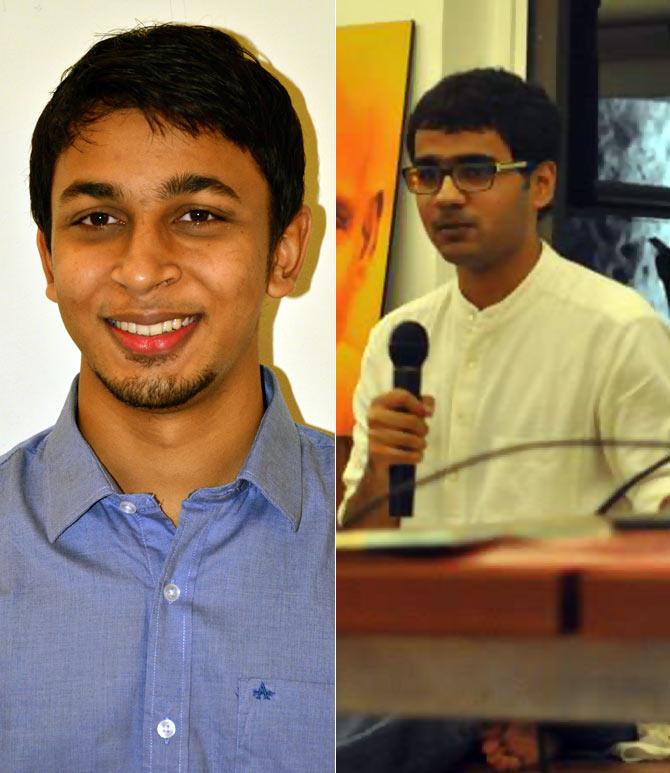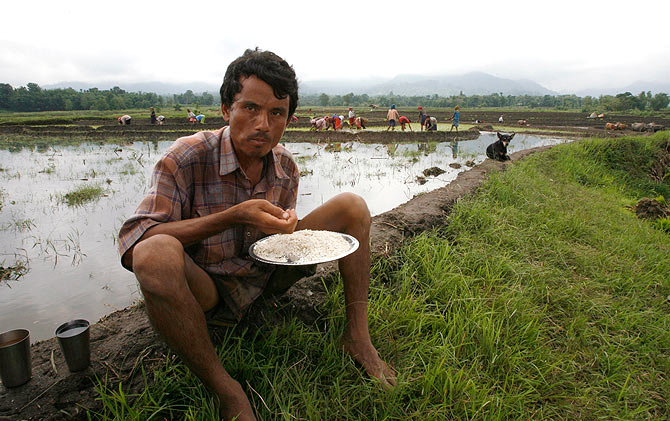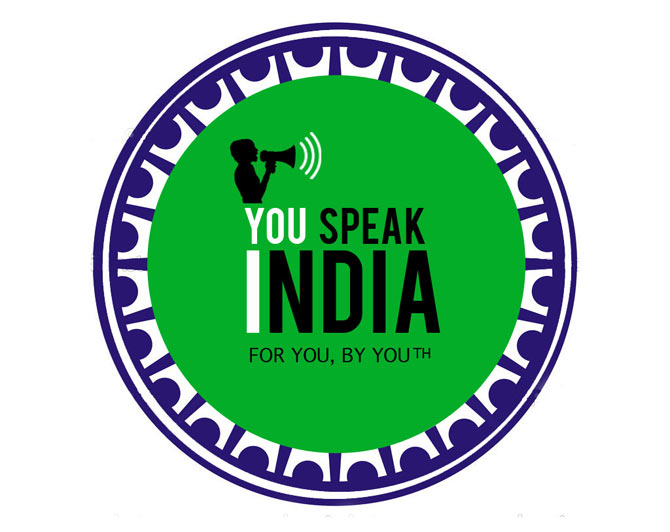S Saraswathi
These two Indians want to change the way urban youth votes.
Anirudh Belle and Vineeth Samdaria, both 21, want to step into the illustrious shoes of noted jurist and economist Nani Palkhivala.
If Palkhivala made his mark in the hearts of thousands of young Indians by decoding the complex web that is the Indian union budget, Anirudh and Vineeth, want to replicate the same experiment in the arena of politics.
The duo has taken upon themselves the onerous task of educating young Indians about the laws and policies that affect India and shape their opinions based on facts by starting You Speak India, a non-profit, youth-run organisation, that promotes civic and political participation by creating an understanding and awareness among the urban youth of India.
“We don’t tear it apart and neither do we exalt a policy. We bring to you exactly what the policy says and you can decide whether it is a disastrous policy or a brilliant policy,” says Anirudh who is a final year economics student from Chennai’s Loyola College.
Discovering the deficit between the consciousness of the average voter in India and the wholesome awareness of issues on public policy and the stands various politicians and political parties take on these fronts, Anirudh and Vineeth decided to pursue the cause of “casting an educated ballot”.
“Our main objective is to make public policy, as such, accessible and engaging for young people,” he adds for good measure.
Though India has the largest numbers of youth in the world, its urban population, sadly, shows indifference towards politics as they don’t vote or register themselves on electoral rolls, the duo feels.
“Their active participation in the upcoming elections will play a vital role,” says Vineeth, also a Loyola College alumni. “Our target right now is the urban youth. They are educated enough to make their own decisions, we are just providing them a platform, where they can discuss, understand and formulate their own opinion about important public policies before making their decision,” he says.
As the countdown begins for the 2014 general elections and the political temperature in the country rises to a feverish pitch as elections in states like Chhattisgarh, Madhya Pradesh and Mizoram already over and due in Rajasthan and Delhi in the coming days, rediff.com caught up with the duo to know how they plan to make a difference in the way the urban youths vote.
What prompted you to start You Speak India?
Anirudh: Prior to the formation of the organisation, I wrote a blog-post titled “Politics, Advocacy and Young People – Putting Two and Two Together.” (link:http://anirudhbelle.wordpress.com/2013/05/27/politics-advocacy-and-young-people-putting-two-and-two-together/) and it received an overwhelming response on social media (even from the likes of Shashi Tharoor and Swapan Seth).
Vineeth was among the first to call and offer his support.
Encouraged by this enthusiastic response and after weeks of discussion with other like-minded individuals, we finally decided to launch YSI on August 15, this year.
How are you educating the youth?
Anirudh: Our main inspiration was derived from the work of Nani Palkhivala, a celebrated lawyer, diplomat and economist, who crusaded the cause of connecting drab points of law and legislation to the common man in India.
Our virtual and physical platforms work together in propagating our cause. Our website, YSI’s debut initiative, features objective and opinion pieces, respectively, in its “PolicyBeat!” and “YouThink OP-ED” sections. We are completely objective about the policy, we don’t tear it apart and neither do we exalt a policy. We bring to you exactly what the policy says and you can decide whether it is a disastrous policy or a brilliant policy.
The “Back to Basics” section offers a comprehensive introduction to India’s electoral democracy, for those who think they need a quick read-up on the basics of public policy.
To translate awareness into action, we strive to encourage young people to register for a Voters’ ID and cast an educated ballot through local and national elections. The “Election Center” tab on our website features a consolidated platform for those who are eligible to vote to register, through the facilities and resources of the Election Commission, on the electoral rolls and similar electoral registrations.
'We want to discuss real issues, policies, programmes, things which are going to affect us'
Photographs: Rupak De Chowdhuri/Reuters
Apart from disseminating information on various Acts, policies and rights of citizens, what else does this platform do? How exactly does it work?
Anirudh: We have a slew of events and engagement platforms, where we make it a point to bring discussion and dialogue on public policy issues to young people across the country. The format of these events is crafted in such a way that the atmosphere is less formal, more participative and, of course, fun. By partnering with student music bands, theater groups, think tanks, etc., our main objective is to make public policy, as such, accessible and engaging for young people.
Why only the urban youth?
Anirudh: Our focus lies on the urban youth primarily because they don’t usually vote, are not registered on the electoral rolls or are objectively aware of public policy issues relevant to the whole of India (largely towards the poor and lesser-privileged as well).
Vineeth: India has the largest youth population in the world. And their active participation in the upcoming elections will play a vital role. We majorly work through websites and social media, so our target right now is the urban youth. They are educated enough to make their own decisions, we are just providing them a platform, where they can discuss, understand and formulate their own opinion about important public policies before making their decision. But we do have plans to approach a bigger audience.
Is it the lack of awareness or just their total disregard for the contemporary political culture?
Anirudh: It could be a mixture of both. There are people who don’t understand it and therefore don’t care and people who are too disgusted with what they read and hear about (politics) through the media and believe it is not worth their time and attention. Maybe it is merely a complete lack of apathy or perhaps it could be the complete victimisation of an individual based on media rhetoric.
For example, when the Food Security Bill or the Land Acquisition, Rehabilitation and Resettlement Bill were being discussed, there was a lot of talk about what Sushma Swaraj, Rahul Gandhi or what various politicians had to say. But there was no talk about what the Bill itself says.
YSI wants to change that, we want to discuss real issues, policies, programmes, things which are going to affect us. We want to know what the Bill says, so that we can decide which team we agree with.
But doesn’t there seem to be more awareness for the 2014 elections, everybody seems to be talking about it.
Vineeth: Compared to the 2009 elections, there certainly seems to be more hype about the upcoming elections. More is being written and spoken about and the media has played a very important part. There is a heightened sense of awareness towards corruption and various issues in the government among the people. The desire and need for a change is growing stronger, everything does seem to be building up towards the 2014 elections.
Are you concentrating only on the upcoming general elections, or do you have an agenda beyond 2014.
Anirudh: Our focus is not only the 2014 elections; the cause is to empower young people in fostering a more informed and participatory democracy. The upcoming election is just a milestone we need to cross. Even post 2014, we will continue to have our events and engagement platforms.
Right now, public policy is too distant a topic for young people to want to engage with, despite it being the most vital factor in casting the vote. We want to make it as appealing as possible and bring it to them in their format, so they are incentivised to want it. Today, what stand politicians and political parties take on vital issues of public policy have become completely irrelevant factors, which is very sad.
'A few years from now, we want to be the "101" for all public policy issues in India'
S Saraswathi
Will this road eventually lead to a more active participation in politics?
Anirudh: My interests lie in economics, law and politics. I am currently doing my final year in economics, after which I plan to pursue a three-year LLB programme. I want to practice constitutional and corporate law before venturing into politics. Though my eventual goal is public life, I don’t want to wait until then to do something. I wanted to do something right now and get the ball rolling. Politics is my absolute intention.
People today are disgusted and unhappy with the current political scene, but for me, I don’t want to stop at just being unhappy because it is not going to get my anywhere, I want to change it.
Vineeth: For me, it is more a social concern. I just want to try to make a small impact on society, do my bit.
Are you influenced by the ideals of any particular party?
Anirudh: There have been many individuals in public life, who have really moulded my thinking. I have a lot of respect and admiration for them, but I can’t say that my admiration for the individual extends to the party as well.
Upcoming events
Anirudh: For the last two months, we have been working on making our website completely functional. And now that our virtual platform is all set, starting this December, we are working towards physical events. I will be travelling to Mumbai, Bangalore and Delhi to visit colleges to recruit, spread the word about YSI and form core teams in different cities. We have partnered with several colleges and have planned many information seminars, open house discussions and debates. We also plan to do video interviews of politicians and upload them on our website.
One of the main events we plan to launch in the coming months is the Constituency Projects. We plan to pick a constituency and the South Chennai constituency is going to be the first in the series. The entire team plans to spend a few months on the road talking to the established individuals in this constituency, the auto rickshaw driver, the dhobiwala, the tea stall vendor, etc, finding out their top five issues and consolidating them all together to form an agenda.
Once the political parties announce their tickets, we will be inviting the candidates who are standing from this constituency, have an open platform and let them talk about their plans and agenda for the constituency, after which they will be quizzed and grilled by the people themselves.
There is no platform for people to ask questions; question the track record or question the intention or even question the efficacy of anything a politician says. It is always a one-way process, where they get up on stage, address a rally and walk away. But they should be questioned; people should be left with no doubts. They should be firm in their stand before they cast their vote. And this is the platform we want to provide them.
We are also going to launch something called Learning Circles right now, where our editorial team will invite people and have open house discussions on several policy issues in discussion in the parliament and local legislatures in an informal setting like coffee shops over cups of coffee and cookies.
Any funding coming in?
Anirudh: We are in the process of identifying people who resonate with our cause. But, we must say, that there are several good people who, so far, have found great interest in our work and cause.
The road ahead...
Anirudh: A few years from now, we want to be the “101” for all public policy issues in India and we seek to be as active a participant as possible in bridging the deficit between the awareness of the voter and the real issues that determine India’s destiny.




Comment
article